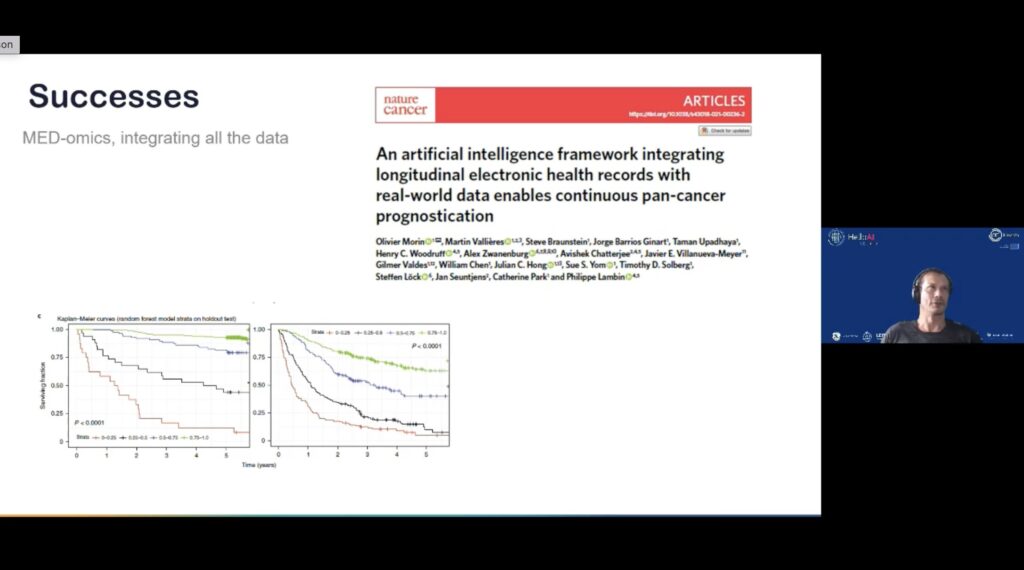The integration of AI into healthcare isn’t just a future possibility. It’s today’s reality. According to McKinsey, 70% of healthcare organizations including payers, providers, and health tech firms have already implemented or are actively pursuing generative AI. Even though traditional machine learning has been used in fields like radiology, many healthcare professionals still lack the foundational knowledge needed to use these tools effectively.
According to a 2025 LinkedIn report, AI literacy has become the most in-demand skill for navigating business change, with C-suite executives three times more likely to add AI-related skills to their profiles than two years ago, and 1.2 times more likely than the general workforce to prioritize these skills. In healthcare, where decisions carry high stakes and systems are complex, the gap between AI potential and practical know-how is particularly significant.
McKinsey also predicts that 70% of job skills will change by 2030, with AI as a primary driver. For healthcare professionals who’ve spent years in specialized training, this represents more than a technology shift. It’s a transformation in how medicine is practiced.
Why AI literacy matters now
When thoughtfully designed and seamlessly integrated into existing workflows, AI enhances productivity. Success hinges on comprehensive training that equips human operators to recognize potential system limitations and edge cases, enabling them to provide informed oversight and maintain effective human-in-the-loop supervision. Four key forces are making AI literacy essential in healthcare today:
When thoughtfully designed and seamlessly integrated into existing workflows, AI enhances productivity. Success hinges on comprehensive training that equips human operators to recognize potential system limitations and edge cases, enabling them to provide informed oversight and maintain effective human-in-the-loop supervision. Four key forces are making AI literacy essential in healthcare today:
- AI is moving into daily healthcare practice: A 2023 American Medical Association survey found that over 65% of physicians now use some form of AI in their practice. AI is no longer limited to pilots or innovation labs. From diagnostic imaging to hospital administration, AI is moving into daily healthcare practice. Radiologists are using AI-assisted tools, nurses rely on predictive models, and administrators deploy AI to streamline operations like scheduling, billing, and staffing.
- Systems built on human-AI collaboration are outperforming humans alone: Research published in Nature 1 demonstrates that human experts working alongside AI make more accurate decisions than either humans or algorithms working independently. Stanford researchers discovered that dermatologists using AI assistance improved their diagnostic accuracy. 2
- AI literacy is essential to career growth: LinkedIn’s 2024 Future of Work Report reveals that healthcare organizations are actively looking for professionals who combine domain knowledge with AI fluency. The report indicates healthcare job postings mentioning AI skills have increased by 74% year-over-year. These individuals are leading implementation projects, shaping strategy, and guiding responsible adoption.
- Patients expect to know how AI is used: Accenture Health’s 2024 survey shows 68% of patients want to understand how AI is used in their care. As AI becomes part of diagnostic and administrative processes, patients seek transparency. They’re asking how algorithms affect their care, billing, and even appointment scheduling. Professionals need the knowledge to explain these systems clearly and confidently.

HelloAI: Three pathways to build skills for AI-enabled care
HelloAI is designed for healthcare professionals at all stages of their journey, from those new to AI to those leading system-wide transformation. In collaboration with industry stakeholders, we offer HelloAI, an educational program designed for healthcare professionals. Available to GE HealthCare customers, colleagues, and any interested healthcare professionals globally, HelloAI had 450 participants in 2024, demonstrating strong industry interest in responsible AI practices. The learning platform offers three learning paths, Basics, Advanced, and Professional. Each path is designed to build the knowledge, skills, and approach needed to work effectively in AI-enabled healthcare.
- HelloAI Basics: Get a clear view of how AI is changing clinical practice
HelloAI Basics is a free introductory course for individuals seeking to understand artificial intelligence without requiring technical background. The course serves students, clinicians, and patients interested in understanding AI applications in healthcare. The curriculum covers AI fundamentals, the evolution of AI technology, and distinctions between AI and traditional rule-based systems. Participants learn about AI model training processes and machine learning principles. HelloAI Basics introduces contemporary technologies including generative AI and large language models (LLMs), while addressing associated risks and ethical considerations. Upon completion, participants gain a comprehensive non-technical understanding of current AI applications in healthcare and emerging trends in the field. - HelloAI Advanced: Get an AI skillset grounded in data, code, and clinical insight
HelloAI Advanced provides students and researchers with comprehensive, academically structured AI education in healthcare. The ECTS-accredited course integrates technical knowledge with practical applications, serving learners pursuing research, digital health, or AI development careers. Participants develop competency in machine learning, deep learning, and rule-based systems, utilizing models such as decision trees, support vector machines, and convolutional neural networks. These technologies are often applied to medical use cases including image analysis, segmentation, and diagnostic support. The program also features hands-on coding components using Python and Google Colab, where learners develop and test code, execute models, and analyze algorithm functionality. This practical experience is complemented by instruction on health data quality, annotation protocols, and data reliability in clinical settings. Finally, HelloAI Advanced provides participants with academic, technical, and ethical frameworks necessary to evaluate, develop, and implement AI solutions in healthcare settings. - HelloAI Professional: Lead with AI in clinical and organizational settings
HelloAI Professional is designed for healthcare professionals, clinicians, and health system leaders who need to implement AI in practice. The program covers strategic planning, responsible adoption practices, and measurable outcomes, providing participants with frameworks to guide AI integration in their teams and organizations. The course examines case studies in radiology, workflow design, clinical diagnostics, and patient engagement. Sessions such as Operational AI for Healthcare and AI Implementation in Clinical Environments demonstrate current AI applications for improving outcomes and efficiency. Participants receive an introduction to Python programming to help understand how AI models function and how to evaluate their outputs. The curriculum covers methods to assess black-box models, identify potential bias, and formulate appropriate questions when evaluating AI solutions. Data governance, patient communication, and trust-building are addressed throughout the program. Participants learn from representatives at GE HealthCare, Mass General Brigham, Alliance Medical, University Medicine Essen, and other organizations about their AI transformation initiatives. Upon completion, participants have the knowledge to develop an AI implementation plan for their institution, with attention to responsible innovation, patient safety, and sustainable change.
“Ultimately, AI’s biggest challenge in healthcare isn’t accuracy. It’s about acceptance. Building trust through knowledge, competence, and responsible implementation is essential to realizing AI’s full potential across the healthcare system,” says Jan Beger, Global Head of Advocacy at GE HealthCare and Executive Director, HelloAI.
As continuous learning becomes essential for career development, HelloAI provides a structured approach for healthcare professionals. The combination of practical application, system-wide perspective, and technical depth ensures healthcare professionals from students and administrators to clinicians and decision makers can navigate the AI transformation with confidence, clarity, and purpose.
Learn more and sign up at https://www.helloaiprofessional.com/
- https://www.nature.com/articles/s41746-024-01031-w#:~:text=AI%20benefitted%20medical%20professionals%20of,benefits%20in%20real%2Dlife%20settings. ↩︎
- https://med.stanford.edu/news/all-news/2024/04/ai-skin-diagnosis.html#:~:text=A%20new%20study%20led%20by,that%20seen%20for%20non%2Ddermatologists ↩︎


